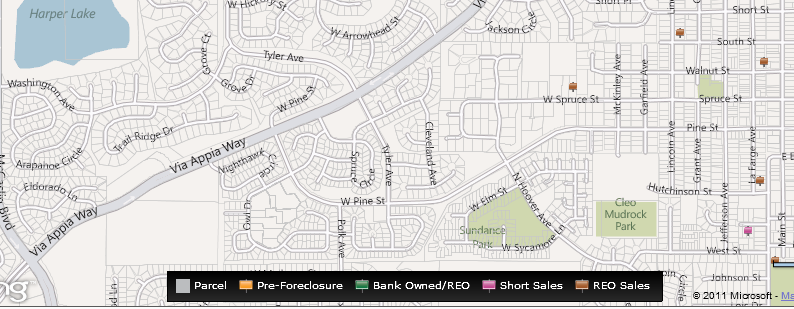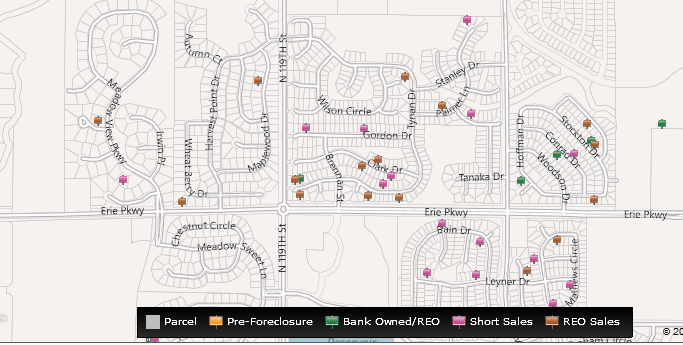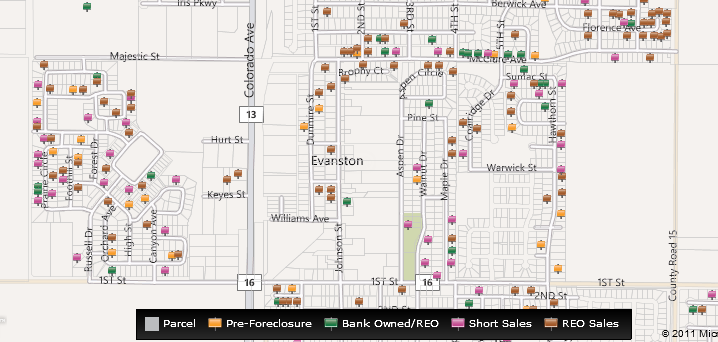
by Neil Kearney | Oct 24, 2012 | Featured, For Buyers, For Sellers, Real Estate 101
Even though we are in a slower time of year, houses are still selling. All year I have been seeing a shortage of good listings in the  market. Right now there are 15% fewer available homes on the market than last year at this same time. This means that if a serious buyer is out looking for a nice home the cupboards are fairly empty. Right now there are many leftover homes on the market. I define leftover homes as those listings that haven’t sold for a specific reason whether it be price, location or condition. This shortage leads to heavy activity on those homes that come on the market ready to sell. Those homes are well priced, in good condition and in a location that doesn’t raise a red flag. This leads to multiple buyers being interested in the same house at the same time. Here is some advice for handling multiple offers from the buyer and seller perspective.
market. Right now there are 15% fewer available homes on the market than last year at this same time. This means that if a serious buyer is out looking for a nice home the cupboards are fairly empty. Right now there are many leftover homes on the market. I define leftover homes as those listings that haven’t sold for a specific reason whether it be price, location or condition. This shortage leads to heavy activity on those homes that come on the market ready to sell. Those homes are well priced, in good condition and in a location that doesn’t raise a red flag. This leads to multiple buyers being interested in the same house at the same time. Here is some advice for handling multiple offers from the buyer and seller perspective.
From The Buyers Perspective:
- Check to see if you have competition. Your agent will call the listing agent to announce your intention to write an offer. Make sure you know if you are competing with another buyer. At the same time have the agent ask for the sellers preferred closing date and for any items that will be excluded from the offer. All of the information below assumes that there is another offer.
- Make your decisions quickly. Getting your offer in a day ahead may make a big difference. Ask for a quick acceptance deadline.
- Do your homework: Check comparable sales and decide the maximum price you will be willing to pay. Also, think about how you would feel if you would lose this house over a couple of thousand of dollars.
- Do a thorough walk-through: When you see a house you are interested in, take your time. Check on the condition of the house, what would you need to do to make it yours. Are the systems (furnace, roof, windows) in good condition?
- Prepare a clean offer: Don’t ask for Sellers to pay for appraisal, cleaning, HOA transfer fees etc. When the seller is considering two similar offers, $50 can make a big difference and send a signal that the buyers asking for all of the small stuff will be tougher to work with down the road on inspections etc.
- Have your financing in place and make sure to include a letter from a lender along with the offer. I prefer to see a local lender who can jump in and make the closing work in a difficult situation rather than somebody who is working a toll free line.
- A nice touch is to write a personal letter to the seller explaining who you are and why you love their house. The seller has an emotional attachment to the house and wants to sell to someone who will take care of their house.
Consider an escalation clause. When the house is a good value and you know there is competition one effective method is to write in an escalation clause. This clause in the contract automatically raises the bid price if another offer beats theirs financially. For instance it could read “the offer price shall be automatically raised to a price $1,000 above any other bonefide offer, the purchase price shall not exceed $xxx,xxx”. This is where the buyer has to know how much they are willing to pay; is it full price or $5,000 over?
From The Sellers Perspective:
- If you are attracting more than one offer it shows that you have taken care of your home and priced it correctly.
- You want to make sure that all interested parties have a chance to submit an offer. Have your agent communicate to each agent who has shown the property recently to gauge interest.
- When reviewing offers look at these main points: net price to you after all closing costs, dates and terms and buyers ability to pay and close. (more…)

by Neil Kearney | Mar 21, 2012 | For Sellers, General Real Estate Advice, Real Estate 101
A few days ago I went through what a buyer needs to think about and do after they have successfully placed a contract on the home.  To read that post click here. Today I’d like to talk about the sellers side of the real estate transaction.
To read that post click here. Today I’d like to talk about the sellers side of the real estate transaction.
Finding a buyer and agreeing to an acceptable price and terms with a buyer is one of the high points of a real estate transaction. No more daily showings, no more uncertainty, making plans for the future, it’s exciting stuff. But then comes the realization that you are only part way to the finish line. There is still work to be done. This is a checklist of items that the seller is responsible for between contract and closing.
Order Title Commitment – In Colorado the seller is responsible to providing the buyer a title insurance policy in conjunction with a real estate purchase. The first step of this process is ordering the title commitment. The listing agent usually handles this for the seller. This is also a great time to provide to the title officer the information on your existing loans which will need to be paid off at the closing.
Homeowners Association Documents – As per the Colorado approved real estate contract the seller will provide the buyer a copy of the relevant HOA documents. This shall include bylaws, rules and regulations, financial documents, minutes from the most recent meetings. Again, this is something that the listing agent usually tries to supply (at least I do) but sometimes the information is embedded in a members only website and the Realtor might need help with this.
Gather Paperwork – The buyer will want to have any relevant documentation regarding the home. In conjunction with the disclosure requirements the seller must supply the buyer any prior inspections or reports that give insight to the condition of the home. This would also be a good time to gather any manuals and warranties and set them aside before your packing gets into full gear.
Prepare for Inspection – Just because most of the showing activity has subsided it doesn’t mean that you are off the hook for keeping the home looking good. I would argue that the inspection is your most important showing and the house should be prepared as well as possible. In addition to the general cleanliness here are a few tips to help the inspection. Replace the furnace filter and clean the humidifier filter if you have one. Move boxes and or furniture away from access points for plumbing, heating and electrical. It is common that a buyer will perform a radon test and the protocol for a radon test is that the house will be closed up for 12 hours prior to closing as well as 48 hours throughout the test. However, it is a really good idea to “air out” the lowest level of the home prior to the closed house conditions.
Make Your Arrangements – Start making arrangements for moving, storage, packing and cleaning. Consult with your Realtor so that you are sure that you understand the timing of when you need to be out and cleaned. After the inspection it is also a good idea to contact the utility companies to let them know about an upcoming transfer in service. Once the deal is rock solid, put in your change of address request to the postal service.
Inspection Items – Once the inspection has been done and the agreements surrounding the inspection has been made, some work will need to be done. My advice here is to get the work done as soon as possible, don’t cut corners and follow the letter of the agreement to a “t”. The listing agent is there to help you get this work done if you need help.
Clean and Closing – The days surrounding closing will be busy days. You will need to pack, clean and supervise work maybe at two locations. My advice regarding how you leave the home is based on two things. Look at the contract and make sure you are doing the minimum required and then consult the Golden Rule. How would you really like a home to be left for you? When the house is really left in good shape and the buyers feel that they are being treated well, the closing is much easier for all involved.
This list is based on my experience and is from the sellers perspective for a sale in Colorado. If you hire a good listing agent, many of these items will happen seamlessly and you will be left to focus on getting your stuff packed and ready to go. I have been a Realtor based in Boulder Colorado since 1991 and I love doing those small things that make it easier for you. When you are ready to list, give me a call – Neil Kearney 303-818-4055

by Neil Kearney | Mar 19, 2012 | For Buyers, General Real Estate Advice, Real Estate 101
Once you have found a home and had a successful negotiation of the offer there are still many steps that need to be completed before you can move in. Here is a primer on the steps that take place between contract and closing from the buyers perspective.
Set The Inspection– It is the buyers responsibility to set and pay for any and all inspections on the home. There are no required

Photo doesn’t have anything to do with the subject, but I took it and thought it was cool.
inspections in Colorado. As a buyers agent or a transaction broker, I provide a list of inspectors that my previous buyers have liked, but a buyer may choose and use any qualified home inspector. It’s a good idea to ask about their services and experience as well as the insurance they carry. The buyer is ultimately responsible for any damage that an inspector may do while at the home. Most inspectors now use digital photography and provide pdf reports which are helpful during a negotiation. In our area radon is common and a radon test is an additional test that an inspector will do for a fee. Read this post to learn more about radon. Keep in mind that all inspections shall be completed prior to the inspection objection deadline as stated on the contract.
Formal Loan Application – Once there is a fully executed contract your lender can then set up a file and start moving your loan forward toward underwriting approval. At this time you will have the option to lock-in an interest rate. While you may have already provided some documentation to the lender. Once they are in the formal approval process (as opposed to pre-qualification or pre-approval) you will undoubtedly need to provide your lender documentation on income, debts, tax returns etc. Please provide these documents as quickly as possible so that any delays can be avoided down the line.
Review Paperwork – The seller will be providing (in most cases through the title company) paperwork regarding the title transfer, property taxes and the Homeowners Association. Your agent and lender will also be reviewing the title documentation for anything abnormal but it is in your best interest to review them carefully yourself or hire an attorney to review them so that you understand what you are getting when you purchase this particular property. The HOA documents will tell you the rules you are agreeing to abide by as well as the financial structure and health of the association. The turnaround time on looking at this information is fairly quick so don’t put it off.
Attend The Inspection – The inspection is the best chance for you to get to know your new home in an intimate way. Following the inspector around for a few hours will give you some good insight on the overall condition of the home as well as a thorough understanding of the conditions that you may ask to be repaired by the seller. As an agent I usually just attend the summary or get the report via email. I leave the inspection itself to the experts. Keep in mind that unless the home is brand new there will be some items that the inspector will point out. It is the inspectors job to be detailed in their inspection.
Inspection Objection with Agent – The next step in the process is to decide a course of action after the inspection. A buyer in Colorado has three choices: 1) move forward as-is and don’t ask for anything; 2) terminate the contract; 3) make a list of unsatisfactory conditions on an Inspection Notice form and present those to the seller. Work with your Realtor at this stage to strategize the best negotiation scenario. It’s best to remember that in most cases focussing on the major issues and/or safety issues will allow for the most productive negotiation with the seller. In my experience, sellers get annoyed if a buyer asks for too many trivial issues. Keep it simple, be specific and hold to the major points.
Other Items – During this entire time you will be making plans regarding moving and packing. Contact your Realtor as to when is a safe time to put non-refundable money down on any services. During this time you will also need to start contacting the local utility companies. This is especially important for those who work at home or depend upon an internet connection. One of the most important things to remember is “DON”T BUY ANYTHING!” Lenders check credit again just before closing and taking on additional debt can spoil the whole deal. Wait on the furniture, wait on the appliances, wait on the new car until after closing. At closing you will need to bring good funds to the closing. This means that you need to bring either a cashier’s check or wire funds in advance to the title company. You will get the exact amount to bring a day or two in advance from the title company via your Realtor or lender.
Closing – Finally it is the day of closing. One of the last stops before going to the title company to sign papers is back to the house for a final walk through. During this final walk through you get one last look at the house to make sure nothing has changed. You make sure that the agreed upon inspection items are complete and you make sure the items that are included are still there. The closing itself lasts about an hour and the buyer does the majority of the signing. In addition to your money make sure you bring a picture ID. The closing is a time to close up any loose ends. Connect with the seller and ask about the neighbors. It is not a time to renegotiate or hold grudges about past negotiations. After an hour or so you will get the keys and you are ready to move in.
Throughout the process it is most helpful to have an experienced Realtor there by your side to help you along and negotiate on your behalf. I have been helping buyers in the Boulder Valley real estate market for over twenty years. I’d love to put that experience to work for you.

by Neil Kearney | Dec 15, 2011 | Boulder Real Estate, For Buyers
Last weeks headlines read “Colorado Foreclosures Down 28%”. Almost every buyer I work with has an interest in looking at foreclosures. Foreclosures are big news, but are they in Boulder Colorado and the surrounding county? After reading the article I decided to delve more deeply into the issue and give you an idea of how common bank owned homes are in our real estate market.
foreclosures. Foreclosures are big news, but are they in Boulder Colorado and the surrounding county? After reading the article I decided to delve more deeply into the issue and give you an idea of how common bank owned homes are in our real estate market.
My first stop was to do a quick tour of my MLS system to see how many foreclosed properties are listed for sale in various areas.
- Boulder – 10 Foreclosures of 664 total listing or 1.5%
- Louisville – 3 Foreclosures of 82 total listing or 3.6%
- Lafayette – 11 Foreclosures of 151 total listing or 7.2%
- Longmont – 36 Foreclosures of 476 total listing or 7.5%
- Superior – 4 Foreclosures of 49 total listing or 8.1%
- Erie – 8 Foreclosures of 172 total listing or 4.6%
- Broomfield – 16 Foreclosures of 376 total listing or 4.2%
- Frederick/Firestone – 11 Foreclosures of 170 total listing or 6.4%
The highest percentage is in Superior at 8% and the lowest percentage of foreclosure listings is in the City of Boulder where just 1.5% of listings were bank owned.
I also looked at the % of homes that in the foreclosure process using Realist which is a public records tool available through my MLS system. Here are the percentage of homes in some stage of foreclosure (rolling 3 month average) for some selected zip codes.
- 80301 (Gunbarrel) – .43%
- 80302 (downtown Boulder)- .41%
- 80305 (Table Mesa) – .23%
- 80027 (Louisville/Superior) – .39%
- 80516 (Erie) – 1.14%
- 80530 (Frederick) – 2.81%
- 80501 (East Longmont) – 1.09%
- 80503 (West Longmont) – .6%
These are very low percentages across the board. The area with the fewest number of homes active in the foreclosure process was the Table Mesa area in South Boulder.
Here are some screen shots showing density of foreclosures in a few select neighborhoods.
Louisville:
Erie:
Firestone:
The maps include properties in pre-foreclosure, bank owned, REO sales (not sure how far back) and Short Sales. I chose an area for each locale that had the most distressed properties. There is quite a difference between different areas. The map for Boulder is very similar to Louisville.
My conclusion is that if a buyer is looking at foreclosure properties exclusively they will not have very many properties from which to chose. We have been very lucky in that our values have held fairly steady and distressed sales are not a huge part of the market. If you would like a list of the foreclosures currently available in Boulder County, please let me know. I would be happy to assist you in your search. I am a HUD approved broker and can help you bid and purchase a HUD home as well.
Links:
Boulder County Public Trustee these properties are only for those buyers who are willing to purchase a property site unseen for cash with no inspection.
by Neil Kearney | Nov 28, 2011 |
Over the past 20 years of selling real estate in the Boulder Valley I have gained a lot of knowledge by having a lot of experiences. Helping  you avoid situations that cause your stress is what I do every day. I love my job because every day is different but as the years have gone by I have definitely gotten better at what I do.
you avoid situations that cause your stress is what I do every day. I love my job because every day is different but as the years have gone by I have definitely gotten better at what I do.
Whether this is your first time buying or selling a home or you are a seasoned pro, here are some general categories of information you might find helpful.
- Real Estate 101 – These are the basics of home buying or home selling. This is what you should be considering when you think about making a change in where you live.
- Statistics – Here is where you will find the latest statistics on the Boulder area real estate market as well as an archive of past data.
- For Sellers – These are topics which are of specific interest when you are selling a home in Colorado.
- For Buyers – These topics include, financing, inspection, valuation, affordability, etc.
- Resources – You will find items like lead based paint information, home energy checklist, home security checklist, radon information, etc.
I have designed this website to be a resource. If you don’t see what you are looking for let me know and I will get you the information you need.
Sincerely,
Neil

 market. Right now there are 15% fewer available homes on the market than last year at this same time. This means that if a serious buyer is out looking for a nice home the cupboards are fairly empty. Right now there are many leftover homes on the market. I define leftover homes as those listings that haven’t sold for a specific reason whether it be price, location or condition. This shortage leads to heavy activity on those homes that come on the market ready to sell. Those homes are well priced, in good condition and in a location that doesn’t raise a red flag. This leads to multiple buyers being interested in the same house at the same time. Here is some advice for handling multiple offers from the buyer and seller perspective.
market. Right now there are 15% fewer available homes on the market than last year at this same time. This means that if a serious buyer is out looking for a nice home the cupboards are fairly empty. Right now there are many leftover homes on the market. I define leftover homes as those listings that haven’t sold for a specific reason whether it be price, location or condition. This shortage leads to heavy activity on those homes that come on the market ready to sell. Those homes are well priced, in good condition and in a location that doesn’t raise a red flag. This leads to multiple buyers being interested in the same house at the same time. Here is some advice for handling multiple offers from the buyer and seller perspective.










